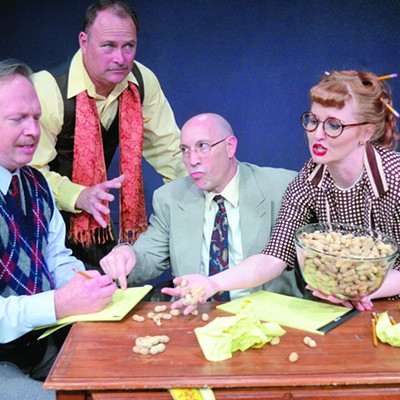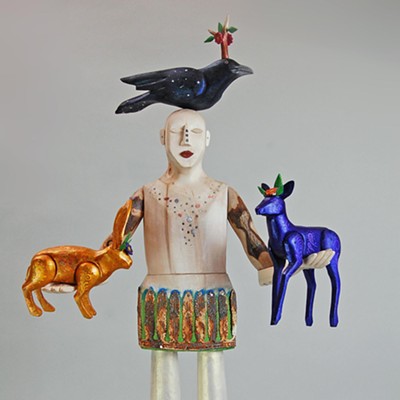A New Look at Immigration Laws
Author Jeffrey Kaye speaks about Moving Millions
6 p.m., Monday, April 26
Bookmans
3733 W. Ina Road
579-0303
7 p.m., Tuesday, April 27
Unitarian Universalist Church of Tucson
4831 E. 22nd St.
748-1551
www.uuctucson.org
When the economy starts to suffer, people tend to look toward immigration, said Jeffrey Kaye, a longtime PBS NewsHour correspondent and the author of Moving Millions: How Coyote Capitalism Fuels Global Immigration.
"Going back to the Chinese Exclusion Act of 1882, if you trace that kind of lineage forward, you can see there have been mass deportations directed against immigrants during economic downturns," he said.
In fact, Kaye said, people who benefit the most when lawmakers crack down on immigration are human smugglers. Smugglers can raise their fees when it becomes more of a challenge for them to get immigrants across the U.S. border, said Kaye.
"The immigration business is a thriving one. As long as the pull is there—the disparity between what is going on in Mexico and what is going on in the (United) States—migration will continue across the border," he said.
"You can't treat immigration as a national problem anymore than you can treat global warming as one," he said. "It is a global issue."
Kaye said American lawmakers need to look seriously at the policies they enact to promote migration.
"If we provide food subsidies to growers in the United States, who are then able to export cheap corn to Mexico, Mexican farmers can't make a living, and they come across the border," he said.
Kaye noted that our country has become addicted to migrants.
"If we want to help agriculture and employment, make it so that Americans will (want to) work in less-desirable occupations," he said.
Admission to Kaye's talks is free. —W.F.
More Isn't Always Better
King Corn with director Aaron Woolf
6 p.m., Saturday, April 24
Fox Tucson Theatre
17 W. Congress St.
624-5019;
Deeply engrained in the American psyche is the idea that more is better, said Aaron Woolf, director of the Peabody Award-winning documentary King Corn.
Woolf chronicles the journey of Ian and Curt, two hipster slackers who move to Iowa and plant an acre of corn. The documentary explores the impacts of 21st-century agricultural technology, and the 11 billion bushels of corn it produces each year.
"On the success side of things, we were able to get 200 bushels of corn off of one acre," said Woolf. "But on the cost side, we became aware of the dangers of producing so much of one thing."
Ian and Curt find out their crop will be used to sweeten sodas that cause diabetes, and to fatten cattle that are used for fast food—all because, Woolf said, Americans are in love with cheap food.
"In King Corn, we saw how bereft of nutritional value corn really is," said Woolf. "And then there is the adverse effect on the environment."
Woolf pointed out that there is a dead zone in the Gulf of Mexico the size of New Jersey where nothing will grow—primarily due to agricultural run-off from the farm belt.
Woolf said today's agricultural productivity is built around fossil fuels.
"One of the reasons we are able to grow more corn out of an acre is using nitrogen fertilizer," said Woolf. "The way we get that is to burn natural gas, and that is not a cheap process."
Productivity is a great measurement of agricultural success; however, we need to have other priorities as well when it comes to our food, said Woolf.
MOCA is presenting the screening, which will include a Q&A with Woolf. Admission is $10, or $8 for MOCA members. —W.F.
That Funny Rabbi
Bob Alper's "Laughter: The Antidote to Recession"
7:30 p.m., Monday, April 26
Congregation Bet Shalom
3881 E. River Road
577-1171;
Bob Alper's comedy routine is completely clean—but what else would you expect from a rabbi?
"They aren't too many rabbi comedians," said Alper.
That's right: Alper was a rabbi for 14 years before he became a fulltime comedian. He said he models himself after other comedians who use non-hurtful humor, such as Bob Newhart.
Alper does see one similarity between the role of a rabbi and his job as a stand-up comic. "I always say that I hope my sermon moves them spiritually—and I hope my audiences feel the same during my shows," Alper said. "Everyone has dreams, and most of the time, they realize it's never going to happen, but I was lucky enough mine did," he said.
Alper realized when he was a teenager that he had an interest in comedy. When he entered a Jewish comedy contest, he realized he might be on to something.
"It's risky and scary, but being able to do it successfully really gives me a feeling of accomplishment," said Alper.
Alper still conducts services during Jewish holy days and has written two books. As for his comedy, his jokes are known for their individuality.
"I have the added element of uniqueness since I can draw material from sources others cannot tap," said Alper. "Such as being a rabbi in a congregation, preaching, officiating at baby-namings, weddings ... ."
When asked what drew him to comedy, Alper said, "Any comedian will tell you: It's a healthy addiction. There's instant gratification. If you do it well—that's laughter."
Tickets are $18 in advance, and $22 at the door. Adults and children age 11 and older are welcome. —T.D.
It Is Easy Being Green!
GreenFest
8:30 a.m. to 2 p.m., Saturday, April 24
Tucson Botanical Gardens
2150 N. Alvernon Way
326-9686;
For people who want to learn ways to make their lives more environmentally friendly, look no further than GreenFest.
Bookmans presented the idea of GreenFest to the Tucson Botanical Gardens as a hands-on event to help celebrate the ideas of Earth Day. Tucson Girl Scouts offered to pitch in and provide activities for kids, in an effort to teach them the same fundamentals and information that adults will be learning.
"It's bringing together a substantial number of community organizations and businesses into one place to talk about all the different ways we can be more green. Rather than seeking out each of these groups individually, Tucsonans can find them all here on Saturday," said Jocelyn Robertson, director of marketing and communications at TBG.
The concept of GreenFest is to show people things they can do to help make their lives—and Tucson—greener. There will be information from Tucson experts on water-harvesting, building green, xeriscaping (landscaping in a way to save water) and composting.
"We're not focusing on grand, abstract ideas, but the little things, cheap things, easy things that you can do right now to make a big difference," Robertson said.
The idea of GreenFest isn't to convince people to completely overhaul their lives. It's to show people that it's easy to live green—in fact, there are many small things people can do to make a big impact on their lives and their carbon footprint.
"Visitors will leave the event with at least one idea that they can put into practice as soon as they get home," said Robertson.
Admission the Botanical Gardens during GreenFest is free. —T.D.








